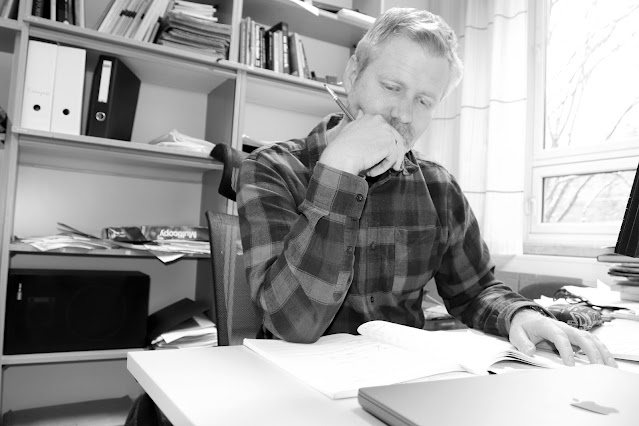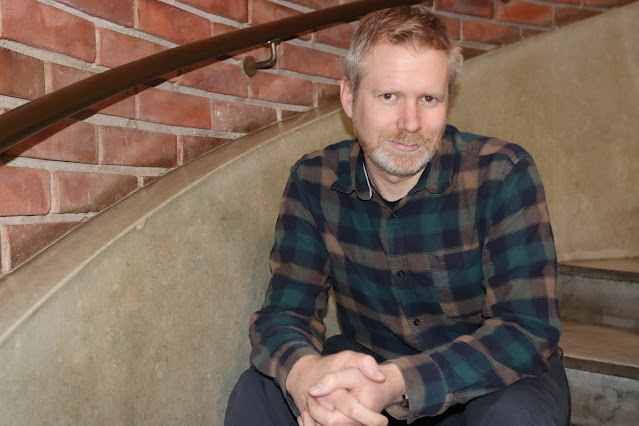 |
| Bjørn Morten Christophersen (Photo Fartein Rudjord UIO) |
Norwegian composer Bjørn Morten Christophersen's recent large-scale works have explored Darwin's On the Origin of Species, the journey of refugees through the life of the Norwegian-born first Duke of Normandy, and a Requiem for Norway's World War II sailors.
His Charles Darwin-based oratorio The Lapse of Time came out on Simax Classics earlier this year [see my review]. A large-scale work for soloists, choir and orchestra, the piece sets Bjørn's own poetic libretto based on Charles Darwin's 1859 book, On the Origin of Species by Means of Natural Selection. Premiered in 2013, in Kristiansund and Ålesund by Ensemble Dali, Kristiansund Sinfonietta and conductor Eirik Sørborg, eight years were to elapse before Bjørn was able to find the finance for further performance of the oratorio and after a year delay because of the pandemic, it was performed and recorded at Frogner Church, Oslo with Ensemble 96, Telemark Chamber Orchestra, Ditte Marie Bræin (soprano), Frank Havrøy (baritone), Inger-Lise Ulsrud (organ), Nina T. Karlsen and Per Kristian Skalstad (conductors).
Bjørn has PhD in musicology from the University of Oslo and an MA in Composing for Film and TV from Kingston University in London. Since 2003, he has taught arranging and composition at the University of Oslo.
Whilst Bjørn is not from a religious family, the fact that he has sung in choirs for many years and plays the organ meant that he was curious about church music and found himself drawn to it. He has also followed the debates between creationism and those who believe in evolution. It seemed that it was becoming impossible for the two sides to consider the two texts, the Bible and Darwin's On the Origin of Species, together. Bjørn grew up with the Natural Sciences, one parent was a doctor and the other a pharmacist. He wanted to make a piece that was meaningful for both sides, for those that believe in the Bible and in Natural Sciences.
 |
| Bjørn Morten Christophersen |
He created his own libretto (in English) out of Darwin's text. It was a painstaking business and he probably spent more time on the text than he did on the music. He wanted to keep the core of the text but simplified and make it singable whilst keeping Darwin's words.
Bjørn and conductor Eirik Sørborg had an idea for a large-scale oratorio, and the form seemed natural for Bjørn given his background in singing and church music. And an oratorio seemed a nice way to treat Darwin, to make music full of wonder. The work moves slowly, giving the listener time to reflect and Bjørn did not use too many lyrics. Another reason for making the music move slowly was the resonant church acoustic, thus tailoring the type of work to the planned performance.
After the work's premiere in 2013, it took nine years before Bjørn was able to bring the recording together. He did not tinker with the music. He tends not to make big changes to works, taking the view that 'this was me at the time' and that we should consider the work as a whole. If he did make changes, then a lot of things could be rewritten but this would reflect that he is now in a different place musically.
Following on from the recording, which was nominated for 2022 Norwegian Spellemannprisen in the TONO Composers’ Prize category, Bjørn is hoping to attract more performances. He comments that he rather needed the recording to get the work out. He is considering adjusting the orchestration, at the moment the work is for a small orchestra, a sinfonietta with single woodwind and brass, and he is thinking about standardising the orchestration.
On 19 March 2023, Bjørn's oratorio Rollos stemme (La Voix de Rollon) premiered in Ålesund Church to celebrate the 175th anniversary of Ålesund City, Norway, with Ålesund Symphony Orchestra, Ålesund Chamber Choir, Lars Thomas Holm (conductor). The oratorio is based on the Norwegian Viking hero who became Rollo, the first Duke of Normandy and ancestor of William the Conqueror. Rollo's tomb still exists in Rouen Cathedral and he is reputed to have hailed from near Ålesund.
Bjørn's libretto is in French, Latin and Norwegian, with the Latin being mainly taken from a chronicle written about Rollo in 1100. But the work is about more than Rollo, it is about the idea of journeying and being refugees, about the positive and negative sides of travelling. Given the French links, Bjørn is hoping that performance in France might be possible.
Bjørn has written a significant amount of music for film and TV, though this work is rather different to his concert work, and for film and TV scores he uses both orchestra and electronics. The big difference is that for film and TV work you have write around the dramatic scene rather than fill the soundscape. Harmony is a bit simpler and though he might use reminiscences of romantic music, the tone is edgier, and of course, you have to make room for the speech. But he likes film and TV work partly because he simply enjoys story-telling.
He has also done a considerable number of arrangements; this is something he enjoys doing, but he admits also that jobs come regularly. He has done arrangements for a lot of pop and rock performers, some of whom he collaborates with regularly, and similarly, he works with the Norwegian Radio Orchestra. Arranging is a different challenge to writing a piece from scratch, and it is a challenge that he enjoys, and there are differences so that if you are working with a band, the restrictions are different to an orchestra.
His most recent work, completed the week before we spoke, is a piece for choir and organ for the Oslo International Church Music Festival. The work sets parts of the Creed, the Universal Declaration of Human Rights, and the United Nations Framework Convention on Climate Change. The common thread between the texts is the idea of belief, so there is religion, humanity and law, and natural science. Bjørn points out that with the climate crisis, you have to believe that it is true yet some people do not. The work is called Credo, et Credis (I Believe, and You Believe), with settings of the different texts being presented separately and then combined into a large movement.
He is currently working on a song cycle, for mezzo-soprano and piano, based on texts by the Norwegian writer Camilla Groth. It will last around an hour and begins with a newspaper notice about an old woman found dead in an apartment, having lain there for months. Her daughter moves into the apartment to sort things out, she had a difficult relationship with her mother and the work is about the daughter coming to an agreement with the memory of her dead mother. Bjørn describes the text as fascinating, mixing memories of childhood with more horrific scenes, from the beautiful to the grotesque.
Having sung in a choir for many years, his music is influenced by the Norwegian and the European choral tradition, with its melodies based on modes, and choral a cappella music affected him a lot. He also counts composers from Bach and Beethoven right through to Ligeti as significant, particularly the orchestral tradition. He also listens to a lot of his contemporary Norwegian colleagues.
His pieces can vary stylistically and they do not necessarily become more complex. Credo ed Credis is somewhat simpler harmonically, partly because he wanted to make a ceremony of it so the choir moves around, and also he wanted to get the text through. He admits that he steals from everyone, but his main interest is in telling stories rather than creating musical landscapes.
As a teenager, he wanted to be a composer, but when he started studying he rather forgot about it. The process of learning about music meant that he wrote himself through music history, from Renaissance to 12-tone, learning techniques and finding things. But he was moving between composing, performing and doing research; he studied musicology, and for his doctorate studied the sketches of the Norwegian composer Johan Svendson (1840-1911). But this was about the compositional process too, as he was establishing the chronology of Svendson's sketches. Svendson wrote two symphonies, and there was talk of him writing a third. Conductor Bjarte Engeset found Svendson's sketches for a movement of this third symphony and asked Bjørn to do a performing version of them and this led to his PhD.
It is for Bjarte Engeset that Bjørn wrote his longest piece to date, Krigsseilerrekviem (Requiem for Sailors at War). Bjørn describes it as an extension of Britten's War Requiem. Bjørn's piece combines the Latin text of the Requiem Mass with letters and diaries from World War II. During the German Occupation, ships from the Norwegian Royal Navy and the merchant fleet were evacuated, and at the end of the war tens of thousands of sailors returned home mentally crippled, having had years at sea, terrified. So the work is about how this affected their families, a subject highly relevant today, making us aware that such actions affect not just now but for decades to come.
 |
| Bjørn Morten Christophersen |
The Requiem was scheduled for performance in 2020, they reached the dress rehearsal and it was then cancelled. The premiere finally took place in May 2022 in Oslo Concert Hall with the Royal Navy Band, The Norwegian Opera Chorus, Tora Augestad (mezzo-soprano), Thorbjørn Guldbrandshøy (tenor), Magnus Ingemund Kjelstad (baritone), Magne Fremmelid (bass) and Bjarte Engeset (conductor) [you can hear it on the Norwegian Radio website]. Indeed, all three of Bjørn's recent large-scale works, The Lapse of Time, Rollos stemme (La Voix de Rollon) and the Requiem, were affected by COVID cancellations.
Never miss out on future posts by following us
The blog is free, but I'd be delighted if you were to show your appreciation by buying me a coffee.
Elsewhere on this blog
- Finding his way: Opera Rara's revival of Donizetti's relatively early L'esule di Roma showed a composer finding his own voice - opera review
- Giovanni Legrenzi: Rinaldo Alessandrini and Concerto Italiano explore motets by one of Venice's most prominent composers - record review
- The Library of a Prussian Princess: Ensemble Augelletti at the Newbury Spring Festival - concert review
- Meditating, listening & letting the music unfold: Syrian composer & musician Maya Youssef on the inspirations behind her music - interview
- Cautionary Tales: the current cohort of Young Artists from the National Opera Studio in an evening of contemporary opera - opera review
- Temple Song: Kate Royal, Christine Rice & Julius Drake in Brahms, Schumann and Weill - concert review
- Silence, texture and atmosphere: music by John Luther Adams, Kaija Saariaho, Judith Weir, and Gary Carpenter at Royal Academy of Music's Fragile Festival - concert review
- Casta Diva: trumpeter Matilda Lloyd showing just what her instrument can do with elegant yet dazzling accounts of Italian bel canto arias - concert & record review
- Stop Motion Music: Edinburgh-based composer Neil T. Smith chats about his new disc, exploring the smaller-scale works he has written from the last eight years - interview
- Henryk Górecki's Symphony of Sorrowful Songs: an astonishing visual treat from Isabella Bywater at ENO - opera review
- Leipzig 1723: we know Bach won, but the fascination of hearing the application cantatas for the Thomaskantor position from Telemann, Graupner and Bach in superb performances - record review
- Home











No comments:
Post a Comment